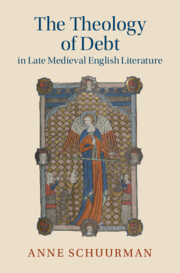Book contents
- The Theology of Debt in Late Medieval English Literature
- Cambridge Studies in Medieval Literature
- The Theology of Debt in Late Medieval English Literature
- Copyright page
- Dedication
- Contents
- Acknowledgements
- Abbreviations
- Introduction
- Chapter 1 Counterfeit Money
- Chapter 2 Secret Debts
- Chapter 3 Home Economics
- Chapter 4 “What is ynogh to mene”
- Chapter 5 Piers Plowman and the Inappropriable
- Epilogue
- Notes
- Bibliography
- Index
- Cambridge Studies in Medieval Literature
Chapter 4 - “What is ynogh to mene”
Measuring Debt in Langland’s Piers Plowman
Published online by Cambridge University Press: 04 January 2024
- The Theology of Debt in Late Medieval English Literature
- Cambridge Studies in Medieval Literature
- The Theology of Debt in Late Medieval English Literature
- Copyright page
- Dedication
- Contents
- Acknowledgements
- Abbreviations
- Introduction
- Chapter 1 Counterfeit Money
- Chapter 2 Secret Debts
- Chapter 3 Home Economics
- Chapter 4 “What is ynogh to mene”
- Chapter 5 Piers Plowman and the Inappropriable
- Epilogue
- Notes
- Bibliography
- Index
- Cambridge Studies in Medieval Literature
Summary
Many readers have seen Piers Plowman as a poem of crisis, a poem that fractures under the weight of its own ambivalence. I argue here that the demonic ambiguity of debt offers a plausible explanation of the conflicting impulses at work in this text. For Langland, monetary exchange, along with the careful accounting practices it demands, as long as it is conducted honestly and fairly, serves as a metaphor of penitential exchange, not paradoxically, not in spite of its corrupting power, but because it is conducive to balance and order, to the practice of virtue and the ethical habits of self-regulation required for true and effective penance. On the other hand, for Langland, the unpayable and infinitely reproducible nature of debt, manifest precisely in the ascesis instituted by grace, produces a troubling limitlessness. The ascesis of debt is, in this way, self-undermining. The debt that cannot be repaid correlates to needs that cannot be measured, and thus to desires that cannot be checked and boundaries that cannot be known.
- Type
- Chapter
- Information
- The Theology of Debt in Late Medieval English Literature , pp. 112 - 135Publisher: Cambridge University PressPrint publication year: 2024



